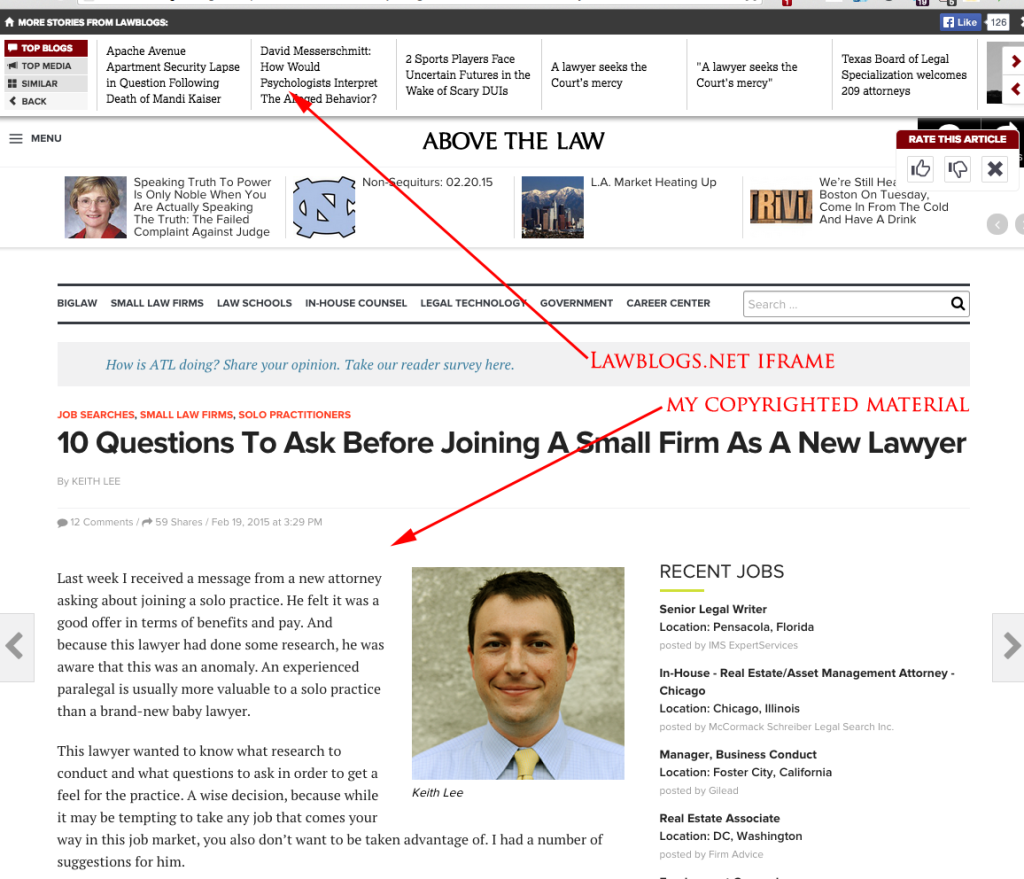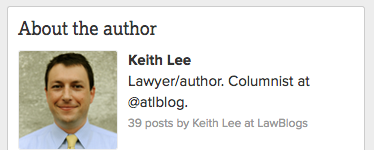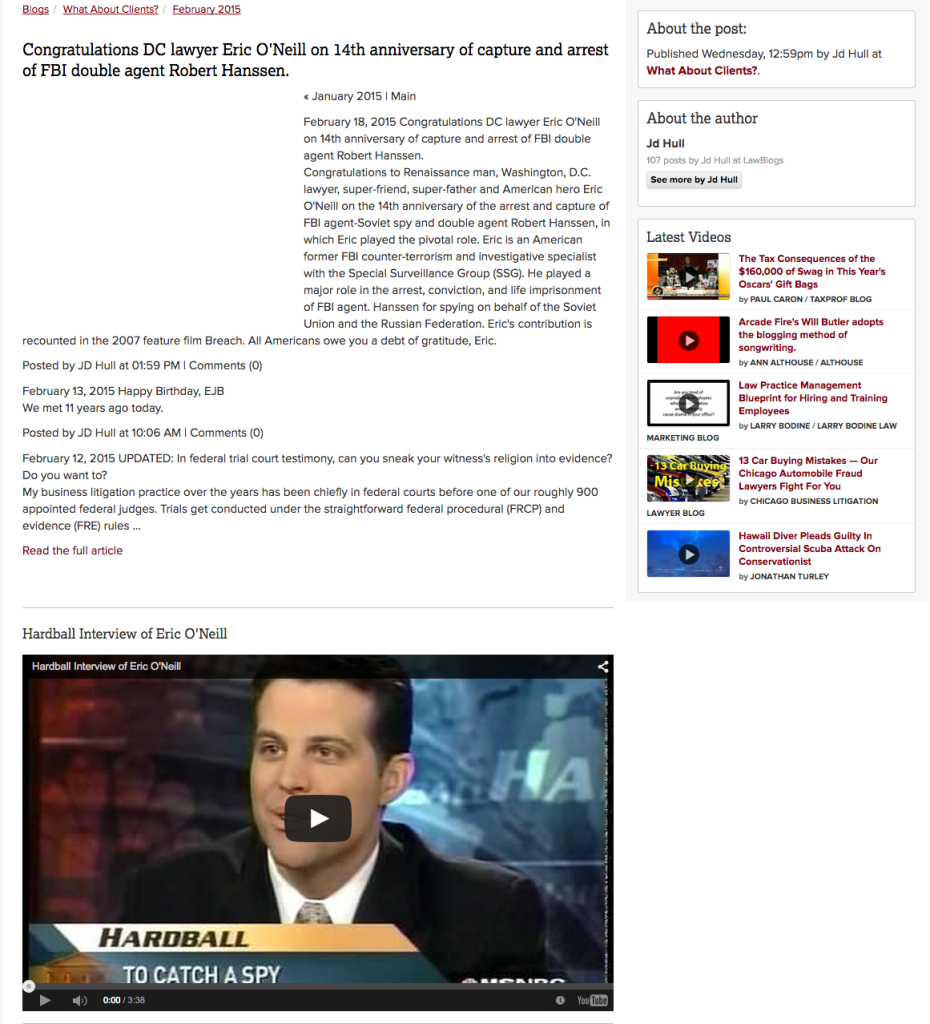2/25/2015 UPDATE: Lawblogs.net has been shuttered, as per its owner. See this post and the comments for details.
The development of the internet has been a wonderful thing for publishing. More people have a platform to have their voice heard than ever before. It allows people to share their voice and broadcast their thoughts (for better or worse). When people take to the internet to consider publishing platforms, many reflexively turn to Youtube, Twitter, or some other hosted solution. That is, a platform that some other entity controls. They do so because such options are familiar or easy to use.
Of course, these sites aren’t providing their platforms to people out of the goodness of their hearts. Youtube, Twitter, pretty much any hosted solution, is there to make money. Some sites charge a premium for access to their content, but most make money off of advertising. They develop and maintain their platforms in order to place advertising around the content they display.
Which is perfectly fine. It’s how media functions. Magazines, TV, books, whatever, are all supported by advertising. Yet in producing content for such platforms in the past, the author/performer was usually compensated. But in the morass of 21st century media, it’s difficult to find an audience. People’s attention spans have been reduced to seconds. There are more outlets vying for their attention than ever before.
As such, people will take to certain platforms for “exposure.” Perhaps a platform provides a larger megaphone and bigger audience than a person might have on their own. It’s why people write for free for sites like the Huffington Post, or publish stories on LinkedIn’s Pulse. The author gets exposure, the sites get free content to provide to their audience.
Which is also perfectly fine. People know what they are getting into (or not) when they agree to produce content for “exposure.” But I’m also not that big of a fan of the concept. For me, it’s fine in some limited context. Writing for a large platform can drive an audience to your own smaller, personal platform. I’ve let large news sites reproduce an article of mine in the past. I’ve also allowed things I’ve written to be re-produced by educational or non-profit groups.
But I am the one who gets to make that decision. And I only get to make that decision because I write my content, on my website, on a platform I control.
That’s the beauty of GPL/open source platforms like WordPress. By paying for hosting and maintaining my own website, I retain full control of where and how my content appears. No one else gets to decide how my content can be used. No one else gets to take what I write and make money off of it but me.
A Matter Of Convenience
Because I control my content and platform, I also get to decide how the content reaches my readers. Most commonly people come read posts on Associate’s Mind. But I also provide email subscription for posts so people can read them in their inbox. Another way I make Associate’s Mind available is via a web format called RSS:
RSS (Rich Site Summary); often called Really Simple Syndication, uses a family of standard web feed formats to publish frequently updated information: blog entries, news headlines, audio, video. An RSS document (called “feed”, “web feed”, or “channel”) includes full or summarized text, and metadata, like publishing date and author’s name.
I do this for the convenience of readers. I am an avid RSS user and I expect many readers are as well. As such, I allow readers to consume Associate’s Mind in a RSS reader of their choice, for personal use. But just because content appears in an RSS feed doesn’t mean it’s being given away for free. It’s just another method by which to consume it. The author/creator of the content still retains their control and copyright of the content.
Of course, people don’t always respect the concept of ownership. This is especially true with things that aren’t real property. Writing, video, audio and other such intellectual property often seems a bit more nebulous to many people. When it’s all just 1s and 0s, people start to feel that ownership is a bit looser of a concept. It’s not of course, and that’s why we have copyright laws. So that when people take your content without your asking, you can use the law to make them cease and desist.
Better To Ask Forgiveness Than Seek Permission
Two years ago, a company called Law Ratchet decided to launch a service that took RSS feeds from many of the popular legal blogs (Associate’s Mind included) and put them into an app for iOS and the web. This is known as content scraping. The app displayed the full content in their app, often times without a link or attribution back to the legal blog. The app didn’t have any subscription model or display advertising at the time, but was planning to monetize in the future. Not that monetizing matters, the app was still infringing on the copyright of the law bloggers.
Needless to say, this didn’t sit well with the lawyers behind the legal blogs. And if there is one group of bloggers that is going to enforce their copyright, it’s law bloggers. In a post at Simple Justice, Scott Greenfield laid out how things were going to go down:
RSS is merely the tool by which individual readers view content. There is a facile assumption by some that because it’s easy to grab off an RSS feed, it must be free for the taking. That’s like saying if someone leaves a potted plant outside their front door, it must be okay to walk over and take it. Because, you know, if they didn’t want you to take it, they would have locked it up in the safe. It’s absurd.
It’s true that some blawgers, particularly those with fewer readers or who subscribe to the “all information should be free” philosophy, don’t mind being scraped. Others overlay their personal sense of propriety, that it’s okay with them provided they get attribution, or maybe a link back. That’s fine, if they don’t care whether someone scrapes their stuff. But that’s not the law, and their sensibilities don’t dictate what’s permissible for other people who don’t share their willingness to be scraped…
At first, the people behind Law Ratchet were defiant, but quickly realized that:
- What they were doing was completely wrong;
- What they were doing was illegal;
- They were about to have a pack of angry lawyers from across the country on their ass.
So the people behind Law Ratchet ended up effusively apologizing and we all let it go.
Although in the writing of this post, I see that LawRatchet has morphed into BigInto.us and is now aggregating post headings from a small number of law blogs. But the site looks pitiful and its copyright footer is still dated 2013. The business model of pre-selected aggregation is actually just not that appealing in the real world. Anyone who wants aggregated news, and the ability to use RSS, is just going to curate such news in their own RSS reader. There is no reason to use someone else’s service.
But that doesn’t stop people from trying. Which brings us to today.
Why Create When You Can Steal?
Over the weekend I stumbled upon a website called www.lawblogs.net, operated by MatBox, LLC, which seems to be solely owned by one Matthias Klappenbach. Lawblogs.net aims to be yet another pre-curated law blog aggregator. It goes out and scrapes an excerpt and image of various law blogs, then displays the content on Lawblogs.net. It also has an option in the heading of the site to either open the full blog post or to stay within Lawblogs.net.
Even if you do choose to go to the source law blog, when it takes you to the site if puts an iframe around the site, keeping the reader in the Lawblogs.net ecosystem.
Why do all this? There isn’t any advertising on Lawblogs.net at the moment, but if you look at the original, German version of the site at www.jurablogs.com, you’ll see that is it covered up with advertising, both on jurablogs.com and in the jurablogs.com iframe. Meaning that MatBox, LLC is making money off of the copyrighted content of a numerous German legal blogs.*
In a post at Lawblogs.net’s own blog, Klappenbach claims that he does all this because it helps keep his developer skills sharp, and that:
I never think about it as “stealing content.” If someone disagrees I will be super quick with removing the specific blog. Articles are never shown in full – only as teasers pointing to the original source.
Just like Law Ratchet, Lawblogs.net has gone with the “better to ask forgiveness than seek permission” model of just lifting law bloggers content. Also known as “steal the content and then create an opt-out option.” Klappenbach also makes the mistake of conflating what he “thinks” about the law, and what the law actually is. As I showed above, Lawblogs.net is following exactly in the footsteps of Law Ratchet. Which means that Lawblogs.net is completely wrong, illegal, and in violation of a number of law bloggers’ copyrights.
In my case, there are 39 posts of mine (from AboveTheLaw) on Lawblogs.net. This is conveniently listed in my profile. You can see a picture of it below.
Apparently these posts are “at LawBlogs” as well and not on AboveTheLaw where they were originally posted. Who knew. I glanced through the lists of blogs on Lawblogs.net and noticed a number of my friends’ blogs listed:
- AboveTheLaw 2748 posts
- Lawyerist 306 posts
- Marco Randazza (who is really going to enjoy this) 140 posts
- Dan Hull 107 posts
- Kevin O’Keefe 270 posts
- Mark Bennett 87 posts
- Evan Schaeffer 60 posts
- Paul Caron 2286 posts
- Matt Brown 33 posts
- Walter Olson 946 posts
- Kevin Underhill 208 posts
- Dan Harris 196 posts
Plus hundreds of other law blogs, most of whom I’m sure don’t realize their content is being displayed at Lawblogs.net.
So there are potentially tens of thousands of copyright violations on display at lawblogs.net. To quote Greenfield in his post about Law Ratchet: can you say “statutory damages?”
But before we go that route, I figure it’s worth a shot to give Klappenbach a chance to set things straight. So, Klappenbach, here’s what you need to do:
- Publically apologize to all of us for stealing our content;
- Acknowledge that what you were doing was wrong;
- Take everyone’s RSS feeds off your shitty, parasitic website.
If you do the aforementioned, I imagine most everyone will be willing to let the matter drop. No need to enter into litigation. Instead, you just get to serve as an example to the rest of the internet that, at least in the legal blogosphere, we do not tolerate content scraping of any sort.
Because if it isn’t crystal clear at this point, you need to do the right thing and stop being a scraper.
UPDATE: Reader Mark Lyon points out there ARE ads on the mobile version of lawblogs.net.
[divider]
* – I’m by no means an expert on German Law, but from my brief reading of the English translation of Gesetz über Urheberrecht und verwandte Schutzrechte (the German copyright/authors’ right statute), it would seem that LawBlogs.net is violation of those German lawyers’ copyright as well.
So if any readers know any of the German lawyers whose content who is being displayed on jurablogs.com, would you kindly send them a link to this article. I’d love to hear what they think.


















